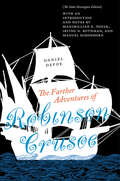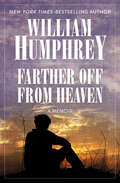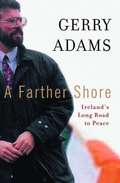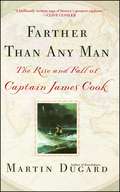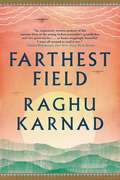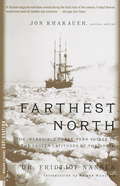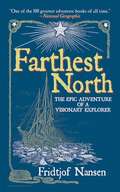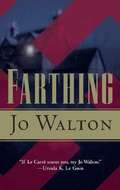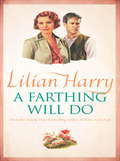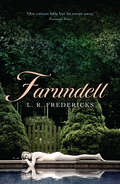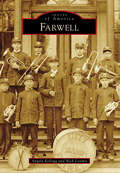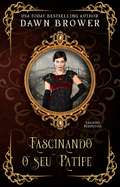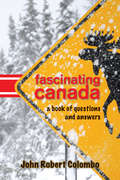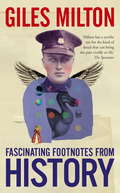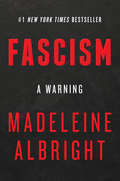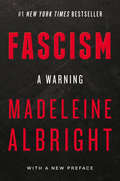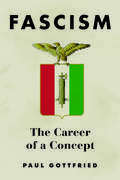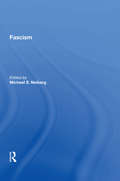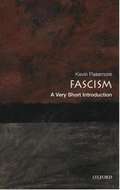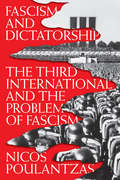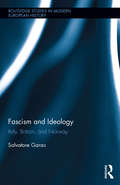- Table View
- List View
The Farther Adventures of Robinson Crusoe: The Stoke Newington Edition
by Daniel Defoe DefoeDefoe’s The Farther Adventures of Robinson Crusoe was almost always published together with The Life and Strange Surprizing Adventures of Robinson Crusoe. Only after 1950 was the first volume printed alone—a shorter work for some classes. But in addition to fulfilling the promise of the first volume, The Farther Adventures is an exciting adventure novel by itself. Crusoe returns to his island to learn about his colony, and then travels to Madagascar, India, and China before returning to England after some exciting encounters. Complete with an introduction, line notes, and full bibliographical notes, this is an edition like no other. Published by Bucknell University Press. Distributed worldwide by Rutgers University Press.
Farther Off from Heaven: A Memoir
by William HumphreyWilliam Humphrey's acclaimed memoir is a richly detailed portrait of small-town Texas and a poignant account of the tragedy that shaped the author's life At three o'clock in the morning on July 5, 1937, William Humphrey awoke to his mother's urgent cry: "Get dressed as quick as you can! Your daddy has been hurt." Rushing to the doctor's office, mother and son arrived to find Clarence Humphrey battered beyond recognition: his chest crushed, his face bruised black and caked with blood, his teeth shattered. He soon drew his final breath. In that terrible moment, thirteen-year-old William knew that nothing would ever be the same again: "I felt slip from me in that moment not only the certainty of my future but the fixity of my past. It was as if I had been wakened out of my childhood." He moved with his mother to Dallas soon after, and although he set his classic novels, Home from the Hill and The Ordways, in his hometown of Clarksville, he would not return for thirty-two years. A masterpiece of autobiography, Farther Off from Heaven is the fiercely honest, exquisitely crafted story of William Humphrey's childhood and the sudden end of his innocence. This ebook features an illustrated biography of William Humphrey including rare photos form the author's estate.
A Farther Shore
by Gerry AdamsHe’s been imprisoned, shot at, denounced, shunned, and banned, yet Sinn Féin president Gerry Adams remains resolute in his belief that peace is the only viable option for the Irish people. Adams led the oldest revolutionary movement in Ireland on an extraordinary journey from armed insurrection to active participation in government. Now he tells the story of the tumultuous series of events that led to the historic Good Friday Agreement as only he can: with a tireless crusader’s conviction and an insider’s penetrating insight. In vivid detail, Adams describes the harrowing attack on his life, and he offers new details about the peace process. We learn of previously undisclosed talks between republicans and the British government, and of conflicts and surprising alliances between key players. Adams reveals details of his discussions with the IRA leadership and tells how republicans differed, “dissidents” emerged, and the first IRA cessation of violence broke down. He recounts meetings in the Clinton White House, tells what roles Irish-Americans and South Africans played in the process, and describes the secret involvement of those within the Catholic Church. Then—triumphantly—this inspiring story climaxes with the Good Friday Agreement: what was agreed and what was promised. Gerry Adams brings a sense of immediacy to this story of hope in what was long considered an intractable conflict. He conveys the acute tensions of the peace process and the ever-present sense of teetering on the brink of both joyous accomplishment and continued despair. With a sharp eye and sensitive ear for the more humorous foibles of political allies and enemies alike, Adams offers illuminating portraits of the leading characters through cease-fires and standoffs, discussions and confrontations. Among the featured players are John Major, Tony Blair, Bill and Hillary Clinton, Jean Kennedy Smith, and Nelson Mandela. As the preeminent republican strategist of his generation, Gerry Adams provides the first comprehensive account of the principles and tactics underpinning modern Irish republicanism. And in a world where peace processes are needed more urgently than ever,A Farther Shoreprovides a template for conflict resolution. From the Hardcover edition.
Farther Than Any Man: The Rise and Fall of Captain James Cook
by Martin DugardJames Cook never laid eyes on the sea until he was in his teens. He then began an extraordinary rise from farm boy outsider to the hallowed rank of captain of the Royal Navy, leading three historic journeys that would forever link his name with fearless exploration (and inspire pop-culture heroes like Captain Hook and Captain James T. Kirk). In "Farther Than Any Man", noted modern-day adventurer Martin Dugard strips away the myth of Cook and instead portrays a complex, conflicted man of tremendous ambition (at times to a fault), intellect (though Cook was routinely underestimated) and sheer hardheadedness. When Great Britain announced a major circumnavigation in 1768 -- a mission cloaked in science, but aimed at the pursuit of world power -- it came as a political surprise that James Cook was given command. Cook's surveying skills had contributed to the British victory over France in the Seven Years' War in 1763, but no commoner had ever commanded a Royal Navy vessel. Endeavor's stunning three-year journey changed the face of modern exploration, charting the vast Pacific waters, the eastern coasts of New Zealand and Australia, and making landfall in Tahiti, Tierra del Fuego, and Rio de Janeiro. After returning home a hero, Cook yearned to get back to sea. He soon took control of the Resolution and returned to his beloved Pacific, in search of the elusive Southern Continent. It was on this trip that Cook's taste for power became an obsession, and his legendary kindness to island natives became an expectation of worship -- traits that would lead him first to greatness, then to catastrophe. Full of action, lush description, and fascinating historical characters like King George III and Master William Bligh, Dugard's gripping account of the life and gruesome demise of Capt. James Cook is a thrilling story of a discoverer hell-bent on traveling farther than any man.
Farthest Field: An Indian Story of the Second World War
by Raghu KarnadA brilliantly conceived nonfiction epic, a war narrated through the lives and deaths of a single family. The photographs of three young men had stood in his grandmother's house for as long as he could remember, beheld but never fully noticed. They had all fought in the Second World War, a fact that surprised him. Indians had never figured in his idea of the war, nor the war in his idea of India. One of them, Bobby, even looked a bit like him, but Raghu Karnad had not noticed until he was the same age as they were in their photo frames. Then he learned about the Parsi boy from the sleepy south Indian coast, so eager to follow his brothers-in-law into the colonial forces and onto the front line. Manek, dashing and confident, was a pilot with India's fledgling air force; gentle Ganny became an army doctor in the arid North-West Frontier. Bobby's pursuit would carry him as far as the deserts of Iraq and the green hell of the Burma battlefront. The years 1939-45 might be the most revered, deplored, and replayed in modern history. Yet India's extraordinary role has been concealed, from itself and from the world. In riveting prose, Karnad retrieves the story of a single family--a story of love, rebellion, loyalty, and uncertainty--and with it, the greater revelation that is India's Second World War. Farthest Field narrates the lost epic of India's war, in which the largest volunteer army in history fought for the British Empire, even as its countrymen fought to be free of it. It carries us from Madras to Peshawar, Egypt to Burma--unfolding the saga of a young family amazed by their swiftly changing world and swept up in its violence.
Farthest North: The Incredible Three-Year Voyage to the Frozen Latitudes of the North (Modern Library Exploration)
by Fridjtof NansenIn 1893 Nansen set sail in the Fram, a ship specially designed and built to be frozen into the polar ice cap, withstand its crushing pressures, and travel with the sea's drift closer to the North Pole than anyone had ever gone before. Experts said such a ship couldn't be built and that the voyage was tantamount to suicide. This brilliant first-person account, originally published in 1897, marks the beginning of the modern age of exploration. Nansen vividly describes the dangerous voyage and his 15-month-long dash to the North Pole by sledge. An unforgettable tale and a must-read for any armchair explorer.
Farthest North: The Epic Adventure of a Visionary Explorer
by Fridtjof Nansen"If Outside magazine had been around during the first turn of the century, Fridtjof Nansen would have been its No. 1 cover boy."-The Chicago Sun-Times In September of 1893, Norwegian zoologist Fridtjof Nansen and crew manned the schooner Fram, intending to drift, frozen in the Arctic pack-ice, to the North Pole. When it became clear that they would miss the pole, Nansen and companion Hjalmar Johansen struck off by themselves. Racing the shrinking pack-ice, they attempted, by dog-sled, to go "farthest north." They survived a winter in a moss hut eating walruses and polar bears, and the public assumed they were dead. In the spring of 1896, after three years of trekking, and having made it to within four degrees of the pole, they returned to safety. Nansen's narrative stands with the best writing on polar exploration. 20 b/w photographs.
Farthing
by Jo WaltonWithout her parents' approval Lucy married a Jew. It was a surprise to her when she and her husband found themselves invited to the retreat. But on the retreat's first night, a politician is murdered, with abundant signs that the killing was ritualistic. Alternative history.
A Farthing Will Do
by Lilian HarryA heart-rending wartime saga, bringing the reality of the end of war to the people of April Grove and Bridge End.Ruth, Lizzie and Heather each have their own reasons for greeting the end of the war with mixed feelings. For Ruth, it means she must face the possibility of losing Sammy, the evacuee boy she has come to love as her own - not to mention the uncertain relationship she has with his father, Dan. For Heather, who has been enjoying working the farm since her husband Ian went away, there is the difficult process of adjusting to a man who believes that his wife's place will now be in the kitchen. And Lizzie is confronted by the truth about her own strength of will in enduring years of loneliness - particularly as her friendship with the American airman, Floyd, deepens.With the coming of peace, life changes more than anyone had expected as the 'love and laughter' that had been promised turn to bewilderment, anger and disappointment. Yet although nothing is quite as they had hoped it would be, they are able to move into a future without war, and learn to live with peace.
Farundell
by L R FredericksFARUNDELL is a story of magical awakening as a young man searches for meaning in the aftermath of the First World War, a young girl comes of age and an old man journeys through memory to death. There's an enigmatic book, an erotic obsession, magic both black and white, a ghost who's not a ghost, a murder that's not a murder, a treasure that's not a treasure. It's about love, loss and longing; language, imagination and the nature of reality. In the golden summer of 1924 Paul Asher, still shattered by the trauma of the Western Front, comes to Farundell, an idyllic country house set deep in the Oxfordshire countryside. There, he falls under the spell of the rich and eccentric Damory family: the celebrated Amazon explorer Perceval, Lord Damory, now blind and dying, whose story echoes Paul's own strange dreams, brilliant thirteen-year-old Alice, on the cusp of adulthood and, like Paul, a seeker of knowledge and, most fatefully, the wild and beautiful Sylvie, with whom he falls passionately in love. Before summer's end, there will be tragedy, comedy, resolution and, for Paul, a revelation that will change his life forever. A stunningly original debut novel, Farundell is literary fiction with a metaphysical twist. Although complete in itself, it is the first in a linked series of novels about these people, places and themes.
Farundell
by L R FredericksFARUNDELL is a story of magical awakening as a young man searches for meaning in the aftermath of the First World War, a young girl comes of age and an old man journeys through memory to death. There's an enigmatic book, an erotic obsession, magic both black and white, a ghost who's not a ghost, a murder that's not a murder, a treasure that's not a treasure. It's about love, loss and longing; language, imagination and the nature of reality. In the golden summer of 1924 Paul Asher, still shattered by the trauma of the Western Front, comes to Farundell, an idyllic country house set deep in the Oxfordshire countryside. There, he falls under the spell of the rich and eccentric Damory family: the celebrated Amazon explorer Perceval, Lord Damory, now blind and dying, whose story echoes Paul's own strange dreams, brilliant thirteen-year-old Alice, on the cusp of adulthood and, like Paul, a seeker of knowledge and, most fatefully, the wild and beautiful Sylvie, with whom he falls passionately in love. Before summer's end, there will be tragedy, comedy, resolution and, for Paul, a revelation that will change his life forever. A stunningly original debut novel, Farundell is literary fiction with a metaphysical twist. Although complete in itself, it is the first in a linked series of novels about these people, places and themes.
Farwell (Images of America)
by Angela Kellogg Nick LoomisIncorporated as the Farwell City Company by wealthy businessmen and nurtured by a few founding families, Farwell was a unique planned community in the wilderness of mid-Michigan. Farwell brought businessmen, lumberjacks, Civil War veterans, hopeful farmers, and other courageous pioneers due to its location at the convergence of a new state road and the railroad, with valuable virgin timber in all directions. Carefully platted and attracting many businesses, Farwell successfully transitioned from lumbering to agriculture as the pioneer days gave way to the new century. While many neighbors became ghost towns, Farwell continued to make additions to the village, open new schools, and create many social and cultural organizations. From its beginnings as a joint stock company and seat of Clare County to the present-day village, Farwell has endured, adapted, and succeeded at providing generations with a small town to proudly call home.
Fascinada pelo Duque
by Éli Assunção Amanda MarielA senhorita Emma Baxter se escondeu em uma carruagem para fugir do tio e do barão com o qual estava sendo forçada a se casar. A última coisa que esperava era se encontrar com o Duque de Radcliffe, Aaron St. John, e sua filha de dez anos, Lady Sophia. Agora ela estava de frente a um perigo completamente diferente.
Fascinando o seu Patife (Legado Perpétuo 10 #10)
by Dawn BrowerLady Catherine Langdon é especial, e não por ela ser a filha de um duque. Ela vem de uma longa linhagem de pessoas nascidas com dons extraordinários, e ela é um dos poucos que tem uma variação de todos os três. Às vésperas da guerra ela tomará uma decisão que irá alterar toda a sua vida: amor ou dever. Asher Rossington, o Marquês de Seabrook, decidiu ainda jovem que nunca teria uma vida ociosa. O pai o proibiu de ser um espião da coroa, mas ele escolheu ignorá-lo. Ash nunca se arrependeu de sua decisão, mas desejava poder ter reparado sua relação com o pai antes que ele morresse. Agora que o mundo está em total desordem, ele precisa fazer outra decisão difícil: continuar sendo um espião para o rei e seu país, ou ir para casa e honrar o título do pai. A Grande Guerra coloca Catherine e Asher um na vida do outro. Só o tempo dirá se eles estão destinados a ficarem juntos, ou se eles servirão a um propósito maior.
Fascinated
by Marissa DayPleasure was an elusive dream... Alicia Hartwell has never experienced the pleasure of passion. Despite all her efforts to comprehend the notion of romantic love, it has remained an utterly foreign concept to her. Resigned to the life of a spinster, Alicia is therefore stunned when she receives a marriage proposal from the highly eligible bachelor, Lord Carstairs. ...until she met him. But Lord Edward Carstairs is not a normal nobleman. He's a Catalyst--able to draw magical power from the natural world to use in spells by human Sorcerers. He senses that Alicia is a victim of enchantment, one that has suppressed her erotic urges. Powerfully attracted to her, he's certain that he's the one to help her experience pleasure for the first time. But as Edward and Alicia's mutual passion burns hot, their fragile love and trust could be threatened by family secrets, and a new magical intrigue neither imagined.
Fascinating Canada: A Book of Questions and Answers
by John Robert ColomboFew people have read as widely in the field of Canadiana as has John Robert Colombo. The curiosity of this Toronto writer, editor, and anthologist knows few if any bounds when it comes to the lore, literature, history, culture, and character of Canada. He has an inquiring mind and he seems able to find national and even international twists to subjects of interest or importance.Fascinating Canada, his latest book, is the product of over half a century of research, reading, writing, and thinking. Some years ago the author produced a trilogy of question-and-answer books 1,000 Questions about Canada, 999 Questions about Canada, 1,000 Questions about Canada. The first two were published by Doubleday Canada, the third one in 2001 by Dundurn Press. The same format is adapted to the material in the present book, but this time the majority of the questions are short whereas a good many of the answers are quite long discussions of the subjects at hand: concise questions followed by considered answers.Here is a book about the Canadian past, present, and future. The information in Fascinating Canada is organized under four headings (People, Places, Things, Ideas) and there is a detailed Index for ready reference. This book may serve as a work of popular reference, but it has been written to stimulate inquiry and spark the sense of surprise in the minds of readers who know something about this amazing country but perhaps not as much as the author. Open this book and begin to read … and match wits with author and researcher John Robert Colombo.
Fascinating Footnotes From History: Fascinating Footnotes from History
by Giles Milton'Giles Milton is a man who can take an event from history and make it come alive . . . an inspiration for those of us who believe that history can be exciting and entertaining' Matthew Redhead, The TimesDid you know that Hitler took cocaine? That Stalin robbed a bank? That Charlie Chaplin's corpse was filched and held to ransom? Giles Milton is a master of historical narrative: in his characteristically engaging prose, Fascinating Footnotes From History details one hundred of the quirkiest historical nuggets; eye-stretching stories that read like fiction but are one hundred per cent fact.There is Hiroo Onoda, the lone Japanese soldier still fighting the Second World War in 1974; Agatha Christie, who mysteriously disappeared for eleven days in 1926; and Werner Franz, a cabin boy on the Hindenburg who lived to tell the tale when it was engulfed in flames in 1937. Fascinating Footnotes From History also answers who ate the last dodo, who really killed Rasputin and why Sergeant Stubby had four legs. Peopled with a gallery of spies, rogues, cannibals, adventurers and slaves, and spanning twenty centuries and six continents, Giles Milton's impeccably researched footnotes shed light on some of the most infamous stories and most flamboyant and colourful characters (and animals) from history.(Previoulsy published in four individual epub volumes: When Hitler Took Cocaine, When Stalin Robbed a Bank, When Lenin Lost His Brain and When Churchill Slaughtered Sheep.)
Fascinating Footnotes From History
by Giles Milton'Giles Milton is a man who can take an event from history and make it come alive . . . an inspiration for those of us who believe that history can be exciting and entertaining' Matthew Redhead, The TimesDid you know that Hitler took cocaine? That Stalin robbed a bank? That Charlie Chaplin's corpse was filched and held to ransom? Giles Milton is a master of historical narrative: in his characteristically engaging prose, Fascinating Footnotes From History details one hundred of the quirkiest historical nuggets; eye-stretching stories that read like fiction but are one hundred per cent fact.There is Hiroo Onoda, the lone Japanese soldier still fighting the Second World War in 1974; Agatha Christie, who mysteriously disappeared for eleven days in 1926; and Werner Franz, a cabin boy on the Hindenburg who lived to tell the tale when it was engulfed in flames in 1937. Fascinating Footnotes From History also answers who ate the last dodo, who really killed Rasputin and why Sergeant Stubby had four legs. Peopled with a gallery of spies, rogues, cannibals, adventurers and slaves, and spanning twenty centuries and six continents, Giles Milton's impeccably researched footnotes shed light on some of the most infamous stories and most flamboyant and colourful characters (and animals) from history.(Previoulsy published in four individual epub volumes: When Hitler Took Cocaine, When Stalin Robbed a Bank, When Lenin Lost His Brain and When Churchill Slaughtered Sheep.)
Fascism: A Warning
by Madeleine Albright<P>A personal and urgent examination of Fascism in the twentieth century and how its legacy shapes today’s world, written by one of America’s most admired public servants, the first woman to serve as U.S. secretary of stateA Fascist, observes Madeleine Albright, “is someone who claims to speak for a whole nation or group, is utterly unconcerned with the rights of others, and is willing to use violence and whatever other means are necessary to achieve the goals he or she might have.” <P>The twentieth century was defined by the clash between democracy and Fascism, a struggle that created uncertainty about the survival of human freedom and left millions dead. Given the horrors of that experience, one might expect the world to reject the spiritual successors to Hitler and Mussolini should they arise in our era. <P>In Fascism: A Warning, Madeleine Albright draws on her experiences as a child in war-torn Europe and her distinguished career as a diplomat to question that assumption.Fascism, as she shows, not only endured through the twentieth century but now presents a more virulent threat to peace and justice than at any time since the end of World War II. <P>The momentum toward democracy that swept the world when the Berlin Wall fell has gone into reverse. The United States, which historically championed the free world, is led by a president who exacerbates division and heaps scorn on democratic institutions. In many countries, economic, technological, and cultural factors are weakening the political center and empowering the extremes of right and left. Contemporary leaders such as Vladimir Putin and Kim Jong-un are employing many of the tactics used by Fascists in the 1920s and 30s. <P>Fascism: A Warning is a book for our times that is relevant to all times. Written by someone who has not only studied history but helped to shape it, this call to arms teaches us the lessons we must understand and the questions we must answer if we are to save ourselves from repeating the tragic errors of the past. <P><b>A New York Times Bestseller</b>
Fascism: A Warning
by Madeleine Albright#1 New York Times Bestseller Best Books of 2018 --The EconomistA personal and urgent examination of Fascism in the twentieth century and how its legacy shapes today’s world, written by one of America’s most admired public servants, the first woman to serve as U.S. secretary of stateA Fascist, observes Madeleine Albright, “is someone who claims to speak for a whole nation or group, is utterly unconcerned with the rights of others, and is willing to use violence and whatever other means are necessary to achieve the goals he or she might have.” The twentieth century was defined by the clash between democracy and Fascism, a struggle that created uncertainty about the survival of human freedom and left millions dead. Given the horrors of that experience, one might expect the world to reject the spiritual successors to Hitler and Mussolini should they arise in our era. In Fascism: A Warning, Madeleine Albright draws on her experiences as a child in war-torn Europe and her distinguished career as a diplomat to question that assumption.Fascism, as she shows, not only endured through the twentieth century but now presents a more virulent threat to peace and justice than at any time since the end of World War II. The momentum toward democracy that swept the world when the Berlin Wall fell has gone into reverse. The United States, which historically championed the free world, is led by a president who exacerbates division and heaps scorn on democratic institutions. In many countries, economic, technological, and cultural factors are weakening the political center and empowering the extremes of right and left. Contemporary leaders such as Vladimir Putin and Kim Jong-un are employing many of the tactics used by Fascists in the 1920s and 30s.Fascism: A Warning is a book for our times that is relevant to all times. Written by someone who has not only studied history but helped to shape it, this call to arms teaches us the lessons we must understand and the questions we must answer if we are to save ourselves from repeating the tragic errors of the past.
Fascism: The Career of a Concept
by Paul GottfriedWhat does it mean to label someone a fascist? Today, it is equated with denouncing him or her as a Nazi. But as intellectual historian Paul E. Gottfried writes in this provocative yet even-handed study, the term's meaning has evolved over the years. Gottfried examines the semantic twists and turns the term has endured since the 1930s and traces the word's polemical function within the context of present ideological struggles. Like "conservatism," "liberalism," and other words whose meanings have changed with time, "fascism" has been used arbitrarily over the years and now stands for a host of iniquities that progressives, multiculturalists, and libertarians oppose, even if they offer no single, coherent account of the historic evil they condemn. Certain factors have contributed to the term's imprecise usage, Gottfried writes, including the equation of all fascisms with Nazism and Hitler, as well as the rise of a post-Marxist left that expresses predominantly cultural opposition to bourgeois society and its Christian and/or national components. Those who stand in the way of social change are dismissed as "fascist," he contends, an epithet that is no longer associated with state corporatism and other features of fascism that were once essential but are now widely ignored. Gottfried outlines the specific historical meaning of the term and argues that it should not be used indiscriminately to describe those who hold unpopular opinions. His important study will appeal to political scientists, intellectual historians, and general readers interested in politics and history.
Fascism (The\international Library Of Essays On Political History)
by Michael S. NeibergThis volume presents the best writings on the origins, development, success and failure of fascism outside Germany. By treating the problem in a global context, these essays together add tremendous complexity to our understanding of one of history‘s most destructive political movements. The collection covers theories, origins and definitions of fascism, fascism in power, fascism in opposition, and fascism in a global and comparative setting.
Fascism: A Very Short Introduction
by Kevin PassmoreWhat is fascism? Is it revolutionary? Or is it reactionary? This book argues that it is both: fascism unleashes violence against the left and ethnic minorities, but also condemns the bourgeoisie for its 'softness'. Kevin Passmore opens his book with a series of 'scenes from fascist life' - a secret meeting of the Romanian Iron Guard; Mussolini meeting the king of Italy; a rally of Hungarian doctors calling for restrictions on the number of Jews entering the profession; the shooting of 1800 Jews by Reserve Police Battalion 101 at Jozefow in Poland in July 1942. He then looks at the paradoxes of fascism through its origins in the political and social crisis of the late nineteenth century, the history of fascist movements and regimes in Italy and Germany, and the fortunes of 'failed' fascist movements in Romania, Hungary and Spain. He shows how fascism used and uses propaganda and popular culture to propagate itself and how it exported its ideas outside Europe, through Nazi and Spanish post-war escape routes to Latin America, for instance. The book concludes with a discussion of the recent revival of the extreme right in Austria, Italy, France, and Russia.
Fascism and Dictatorship: The Third International and the Problem of Fascism
by Nicos PoulantzasPoulantzas’s book is the first major Marxist study of German and Italian fascism to appear since the Second World War. It carefully distinguishes between fascism as a mass movement before the seizure of power and fascism as an entrenched machinery of dictatorship. It compares the distinct class components of the counter-revolutionary blocs mobilzed by fascism in Germany and Italy; analyses the changing relations between the petty bourgeoisie and big capital in the evolution of fascism; discusses the structures of the fascist state itself, as an emergency regime for the defense of capital; and provides a sustained and documented criticism of official Comintern attitudes and policies towards fascism in the fateful years after the Versailles settlement. Fascism and Dictatorship represents a challenging synthesis of factual evidence and conceptual analysis that has been rare in Marxist political theory to date.
Fascism and Ideology: Italy, Britain, and Norway (Routledge Studies in Modern European History)
by Salvatore GarauThis book develops a number of new conceptual tools to tackle some of the most hotly debated issues concerning the nature of fascism, using three profoundly different national contexts in the inter-war years as case studies: Italy, Britain and Norway. It explores how fascist ideology was the result of a sustained struggle between competing internal factions, which created a precarious, but also highly dynamic, balance between revolutionary/totalitarian and conservative/authoritarian tendencies. Such a balance meant that these movements were hybrids with a surprising degree of internal diversity, which cannot be explained away as simple opportunism or lack of ideological substance. The book's focus on fascist ideology's internal variety and aggregative potential leads it to argue that when fascism "succeeded," this was less an effect of its revolutionary ideas, than of the opposite – namely, its power to integrate elements from other pre-existing ideologies. Given the prevailing opinion that fascism is revolutionary by definition, the book ultimately poses a challenge to the dominant view in the field of fascist studies.
